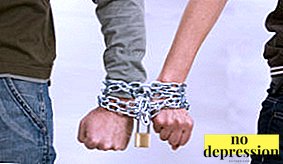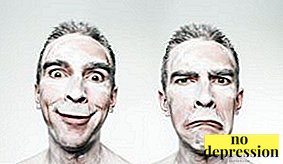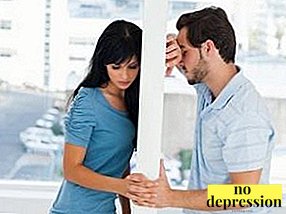Sensible people often have a question: why are there so many good women in our country who objectively live with no men: drunkards, rowdies, drug addicts?
Psychologists explain this fact with the term "codependency". There are still disputes whether it is a disease or not (like alcoholism).
And gradually the meaning of the word expands: if earlier they were designated unhealthy relationships with alcoholics, drug addicts and other addictive personalities, now the range of use is growing.
What it is?

Psychologists give different definitions this term.
Key in all definitions, the behavior of a co-dependent person is not his own choice, but is determined from the outside (most often his mentally unhealthy couple).
This is an ineffective model of action, leading to the destruction of the individual, psychological discofmort.
Simpler: the actions of the co-dependent are determined not by his own interests and needs, but by the patient. Examples include wives of drunkards who only think about how to hide a husband’s vice (“what people will say”), diligently pretending that everything is fine in a family.
At the same time, they only think about whether they drank or not, how much they drank, that they drank, and not about the fact that from these experiences more and more often they grab the heart and it would be necessary to go to the doctor and take care of your health.
Not only is code dependent (he forgets about his health, appearance, hobbies), but also his inner circle: the mother is unable to fully take care of the children, because all her energy is directed at her husband.
Kids grow up with psychological trauma, the possibility increases that in adulthood they themselves will enter into destructive relationships.
As mentioned above, it is not necessary to have a partnership with an alcohol or drug addict.

Can choose" mentally ill, a participant in hostilities with PTSD and devote his life to reading books on psychological assistance and trying to “heal” mental trauma.
Forgetting that this time could be spent on own development.
Psychology and causes
The basis of co-dependencies is the suppression of one’s own "I" hiding experiences to please another.
And it is impossible to crush him with impunity - the repressed emotions do not disappear anywhere and result in neuroses, outbursts of hidden anger and aggression, constant tearfulness, depression, supposedly arising out of nowhere.
The global cause of the emergence of code-dependent relationships is low self-esteem, most often originating in children's psychological trauma.
Children “disliked” by parents do not believe that they can be accepted and loved for who they are and try their best “Deserve” love.
They take responsibility for the feelings and experiences of others, try on the role of "saviors". These are people who try to please everyone.

They often assume that their sacrifice make others admire them.
This misconception often finds confirmation in religious beliefs.
Another variant - displaced pain. Children identify with parents of their gender, and if they are in a co-dependent relationship, a little boy or girl will experience the same emotions.
But they are too small to rationally survive this, and they do it when they get older: repeat the fate father or mother, hoping for a different outcome.
Karpman's Triangle
The schemas of code-dependent relationships fit well into this interaction model, such as the Karpman Triangle. Each of its peaks is a certain role in social interaction:
- victim,
- pursuer,
- savior.

The first is the one who "Suffering". The second is the one who makes the demands and "Torments" her.
The third is the one who tries "help". All these words are quoted, because each has its own egoistic motives in the scheme.
The victim enjoys his role, because she justifies impartial acts and allows you to manipulate others at the expense of pity.
The Savior satisfies its own psychological needs. And roles can change constantly.
The rescuer and the victim are often in a co-dependent relationship.
Example: unrecognized writer and his wife-muse. The “creative genius” in this case plays the victim - he regularly gives out masterpieces, but publishers do not accept them.
Of course, solely by virtue of collusion in the mastodons of the pen, who are afraid of competition, and not because the works are not of raw and artistic value.
He suffers, and if so - you can not get a job and do not support the family.
The wife supports the unfortunate in every way and pulls everything away: this is how she becomes the “savior” of a genius, and not a woman who chose an infantile man and does not value herself so much that she is afraid of losing even this relationship.
In the alcoholic family

The classic example of codependency is: family of drunks. There may be two schemes:
- Alcoholic victim (I drink because I am not recognized / I fought / had a difficult childhood and thousands of other reasons) and a savior partner (he is not guilty, he needs help, and I will help him and deserve love).
- Alcoholic pursuer (I drink, because you brought me (a)) and the partner-victim (I suffer so much, but I bear my cross, take pity and love me for it).
Most often, children born in such families repeat the fate of parents. The little girl sees her mother trying to save her alcoholic father, but he continues to drink. She unconsciously identifies herself with the closest person, and mother’s failure is hers.
Only if an adult is able to survive this, rationally comprehend, then the child is not.
In the future she will try relive a traumatic experience and resolve the situation: find the same alcoholic and start taking care of him.
If he quit drinking, it’s the same thing as dad would have quit. The pain disappeared, because she managed! But the problem is that people rarely change, and most likely it will fail.
Counter dependency

Potentially co-addicted people very often enter into a relationship with counter-dependent.
It is like two poles: co-dependents are completely dissolved in the partner, forgetting about themselves, and counter-addicts avoid any closeness.
Here, too, mental injuries of the first years of life most often affect. But if the “disliked” become co-addicted, then those who were hurt by love are counter-dependent.
it victims of hypertext on the part of the parents, when each step was controlled, incest; those who have lost relatives.
As soon as the emotions become too strong, the subconscious gives a warning: the pain will be no less severe, you need to keep control. Run away
Combination of co-dependent and counter-dependent almost perfect: the second quickly comes to his “point of no return”, the first finds him an excuse and agrees not to demand anything, once again confirming his own low self-esteem.
And everything would be fine, but both have neurosis. Relationships without real intimacy and partnership are always destructive.
The counter-dependent suffers from a lack of emotion, a code-dependent - from the need to repress them.
Emotional addiction

Emotional addiction is another. edge of destructive relationships.
An addict also refuses his own thoughts and feelings in favor of a loved one.
All his emotions are determined by actions (or inaction) addict - the one whom he accepted as a subject of adoration.
From here comes the total control over your counterpart (this is not necessarily a partner - maybe a child, a friend, etc.): calls dozens of times a day, requirements, blackmail (“Do you love me? A monster, how can you do this to me!”, “Shameless, is it difficult to call your mother, I'm worried about you, my blood pressure jumped”).
Both sides of the relationship feel discomfort.
Such behavior also begins in early childhood, when the child is completely dependent on the mother, and she leaves him or does not show love.
In adulthood, when communicating with loved ones, he relives. impotence, fear of a defenseless baby. From here - panic attacks, neurosis, even psychosis up to a suicide.
How to get out of codependency?

How to get rid of codependency in relationships?
To get out of destructive relationships, you must first understand how they were born.
As we have said, most often these are the consequences of low self-esteem, so you have to learn to love yourself, accept and understand that you deserve more.
How to do this is another question. Usually need psychotherapist help, which will reveal children's injuries and help relive and comprehend the painful experience.
Another option is socially dependent support groups. They are represented in social networks, there are personal meetings. There, people share their stories, problems, how they solved them.
The victims of code dependencies come together in pairs and call each other as soon as they feel the likelihood of a “breakdown” (though fraught with a new form of destructive relations with emotional attachment).
This may be reading the literature on the problem, introspection and reflection, but the path is rather complicated - it is hard not to turn off without support, leaving everything as it is.
In any case, it all starts with an awareness of “I feel bad” and decisions to change it, even if in the process a relatively equilibrium system is broken, where all psychological demons are satisfied with the situation, and the person himself suffers.
Psychologist's opinion on codependency:



